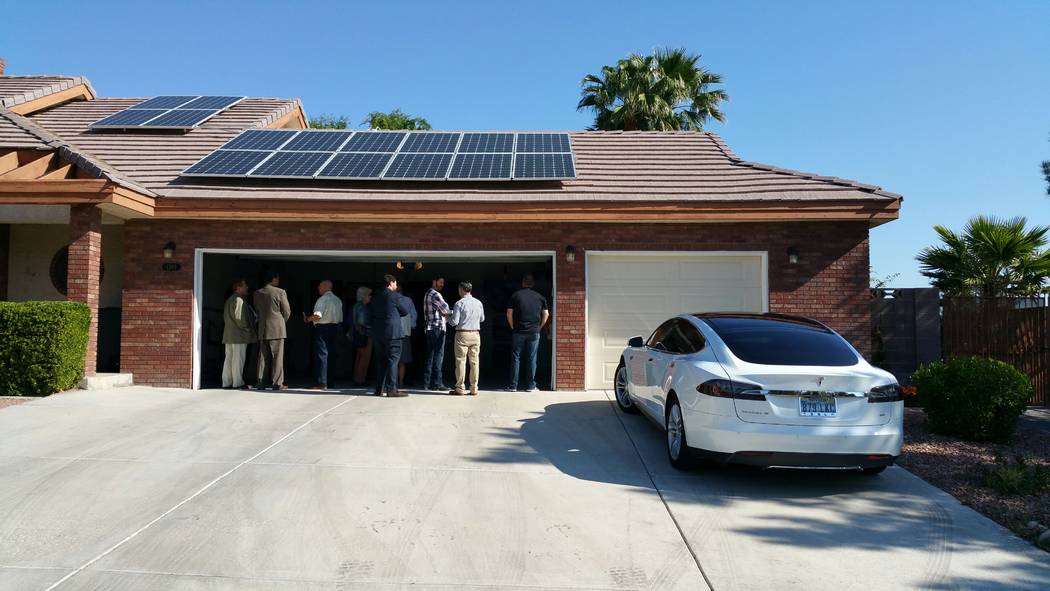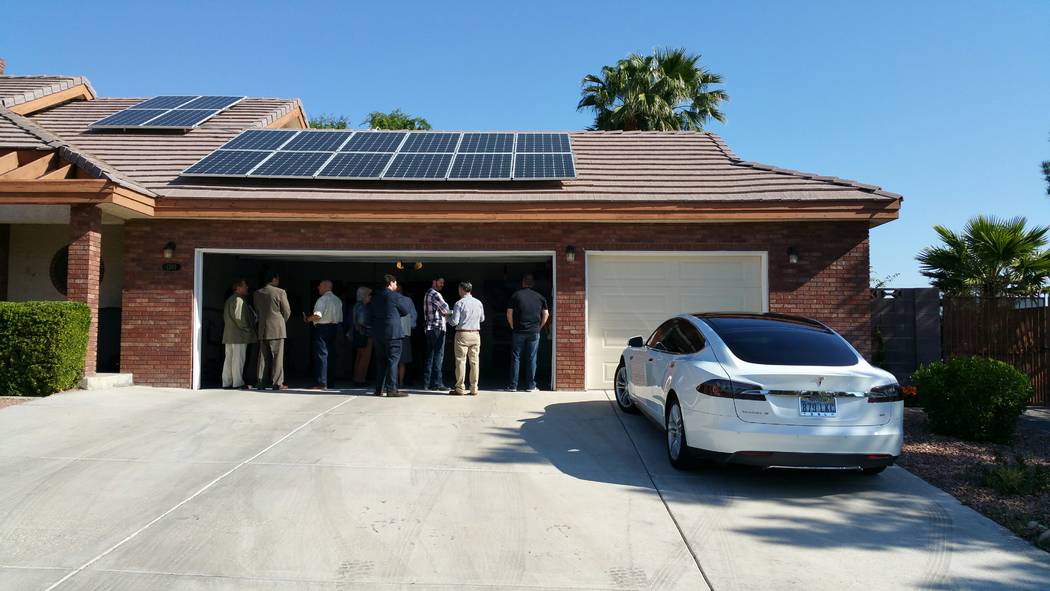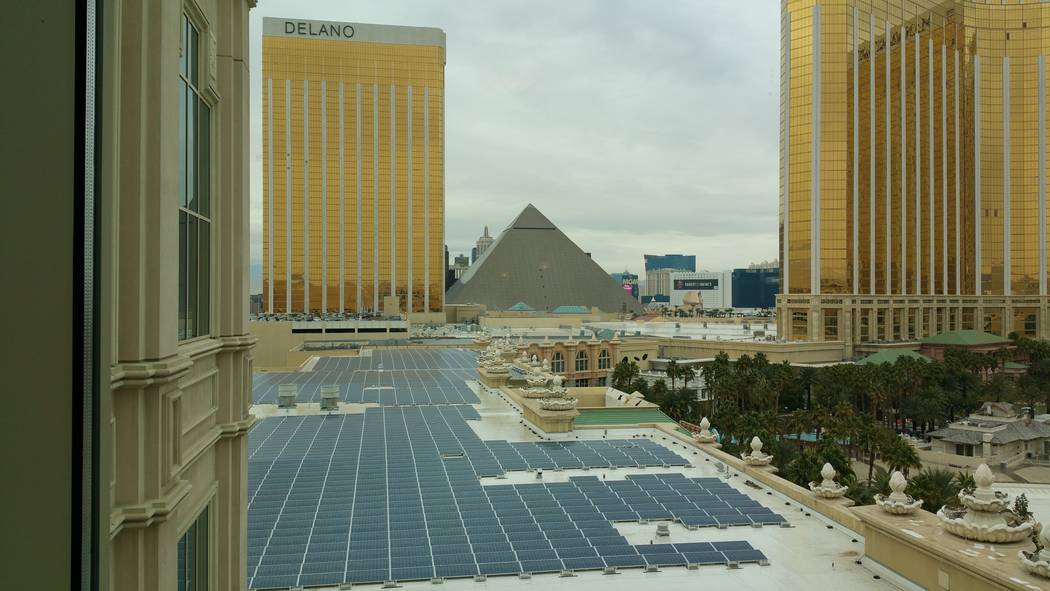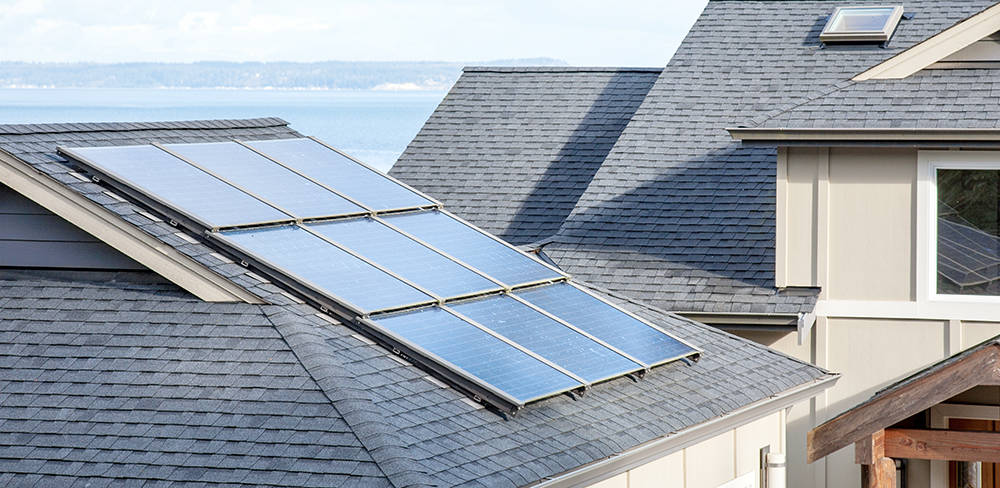Rooftop solar rebounds; still faces challenges
Southern Nevada homeowners who install photovoltaic solar panels on their rooftops can harvest the abundant sunlight that shines on the Mojave Desert more than 300 days a year to generate electricity for their homes and even for their personal transportation.
However, regulatory infrastructure to support the growth of an emerging rooftop solar power industry continues to be a challenge to state legislators and utility administrators. Meanwhile, Las Vegas homebuilders remain cautious about relaunching their solar panel installation programs until state laws shake out.
During the 2017 state legislative session in Carson City, Gov. Brian Sandoval signed into law Assembly Bill 405, which created a consumer bill of rights for homeowners who might be considering installing photovoltaic solar panels on top of their roofs and connecting the panels’ energy output to a local utility grid.
AB 405, co-authored by Assemblymen Chris Brooks, D-Las Vegas, District 10, and Justin Watkins, D-Las Vegas, District 35, sought to create more certainty for homeowners over the next 20 years by defining guidelines that included net-metering credits and rate structures for state utilities, vendor contract requirements, and paths of recourse for consumers victimized by faulty installations or bad business practices.
As a result of the new statute, the rooftop solar industry has bounced back during the second half of 2017. Large companies like Sunrun, Vivint Solar and Tesla have re-entered the state to provide rooftop solar installation services alongside smaller Nevada companies, who have also been hiring more employees over the last eight months.
“Robco Electric is happy to announce that our solar sales have increased over 1,000 percent since the signing of AB 405,” said Rob Kawlczik, president of Robco Electric in Las Vegas. “Robco Electric solar team has increased by 300 percent and these are all Nevadans put back to work in the solar industry.”
According to Vote Solar, an industry advocacy group, Nevada now ranks 10th in the nation for solar jobs with 6,564 employees during 2017, but is second in the nation per capita. California is the state with the largest number of solar jobs at 86,414.
The Trump administration announced in January that it would apply tariffs of 30 percent to imported Chinese solar panels, in an attempt to protect domestic U.S. manufacturers of solar cells.
According to Karen Wayland, executive director of the Clean Energy Project, these increased import costs on Chinese solar panels will raise prices on residential solar installations by about 3 percent. The costs of photovoltaic panels are a relatively small percentage of overall rooftop installation costs, compared with a utility-scale solar installation project, which could see a cost increase by as much as 10 percent due to the tariff, according to the group’s website, cleanenergyprojectnv.org.
The Energy Choice Initiative, Question 3, on the upcoming November ballot, also will present a new challenge to state voters, legislators and utility administrators during the 2018 election cycle.
Proponents of the initiative, sponsored by Switch and Las Vegas Sands Corp., state that creating an open, retail market that allows consumers to purchase energy directly from vendors will bring more jobs, more renewable energy, lower power bills and provide energy freedom. More information from the Energy Choice Initiative campaign can be found at this www.energyfreedomnv.com.
The Energy Choice Initiative seeks to partially deregulate monopoly electricity generation by state utilities through an amendment to the state constitution. If the initiative is approved by voters in November and implemented by 2023, an electric utility, such as NV Energy, would no longer administer power purchase agreements with major energy providers, but would retain monopoly control of electricity transmission and distribution through its utility grid.
An electric power consumer would receive two monthly bills: one from an energy provider on an open retail market, and one from the local utility to cover transmission and distribution of the electric energy through its utility grid.
Proponents of the initiative state that creating an open, retail market that allows consumers to purchase energy directly from vendors will bring more jobs, more renewable energy, lower power bills and provide energy freedom.
The Energy Choice Initiative was initially approved by state voters during the November 2016 election ballot, where a Yes vote on Question 3 passed by a margin of 72 percent to 28 percent.
If approved by voters a second time during November 2018 through the initiative ratification process, the ability of homeowners to choose their own electric energy provider will become a state constitutional right rather than just a law governed by Nevada Revised Statutes.
However, making the transition from the goals and intentions of the initiative writers into practical law and administration has opened up a myriad of issues and problems that may not easily be resolved.
During the 2017 legislative session, Sandoval created a Governor’s Committee on Energy Choice led by Lt. Gov. Mark Hutchison. There are now 25 members on this committee, with five working groups that include stakeholders, who are looking at the practical challenges involved to implement the initiative.
The Public Utilities Commission of Nevada has been studying issues surrounding the Energy Choice Initiative and conducted two weeks of investigative hearings during January, which generated thousands of pages of comments.
Some of the related issues being studied by the committee’s working groups include construction of the retail energy market; consumer protection; utility stranded assets; generation and transmission; and the effects of the initiative on innovation, technology and renewable energy within Nevada.
“Everybody is to get retail energy choice, everybody under that constitutional amendment,” said Jennifer Taylor, director of the Innovation, Technology and Renewable Energy Working Group.
“This is a really unique way to try to open up a retail energy market. It has never been done by constitutional amendment,” Taylor said. “What do you do for people who live in a situation where they do not control their meter? How do you allow people to have constitutional choice when they live in an apartment?”
Assemblyman Brooks, co-author of AB 405 and a member of the Governor’s Committee on Energy Choice, was also not encouraged by the present constitutional implementation process defined by the initiative.
“As an elected official, I represent constituents from the state of Nevada. I have to look out for the overall health of the state economy, the goals and aspirations of the state for renewable energy, and the protection of ratepayers, especially those who can least afford it,” Brooks said.
“If Energy Choice can advance our state’s clean energy agenda and can lower the cost of energy to ratepayers, particularly low-income ratepayers, then I’ll support it. If it doesn’t do those things, it is my obligation and my responsibility to oppose it.
“The processes I’ve seen so far have not demonstrated to me that the Energy Choice Initiative can do either one of these things. I’m very skeptical. This issue has been consuming most of my time for over a year now,” Brooks said.
The Governor’s Committee on Energy Choice will be summarizing recommendations by its five working groups, along with recommendations by the Public Utilities Commission of Nevada, and will publish the resulting reports in March.
Although national homebuilder corporations, such as Lennar, have been working directly with the Governor’s Office of Energy to help guide policy decisions, many homebuilders remain cautious about offering solar power systems as options on new homes until state laws become more consistent and stable.
After an initial decision by the Public Utilities Commission of Nevada during December 2015 allowed utilities to raise grid connection fees and cut reimbursement rates to net-metered homes with rooftop solar power systems, many homebuilders removed solar installations from model homes within their new communities when large-scale providers, such as SolarCity, Sunrun and Vivint Solar initially left the state.
Since that time, most local homebuilders have continued to provide electrical prewiring options and conduit space to accommodate residential solar power systems within new communities, but left installation decisions to each individual homebuyer to negotiate with service providers directly.
“It is a pretty simple process,” said Michelle Carpenter, community manager at the Cadence, a Henderson master-planned. Cadence has featured new communities with models developed by Richmond American Homes, CalAtlantic Homes, Woodside Homes and Lennar. “You will need to get a quote and drawing plan from a solar power installer that will then be submitted to the Cadence homeowners association for design review, along with a standardized application form. The HOA has approved a lot of these solar installation applications during the last year.”
National homebuilder Lennar employs a solar installation subsidiary company, SunStreet Energy Group, to provide turnkey solar installation options and service contracts for new homebuyers. Lennar has provided the services of its subsidiary to other homebuilders like CalAtlantic Homes.
The Las Vegas Review-Journal is owned by the family of Las Vegas Sands Corp. Chairman and CEO Sheldon Adelson.


























